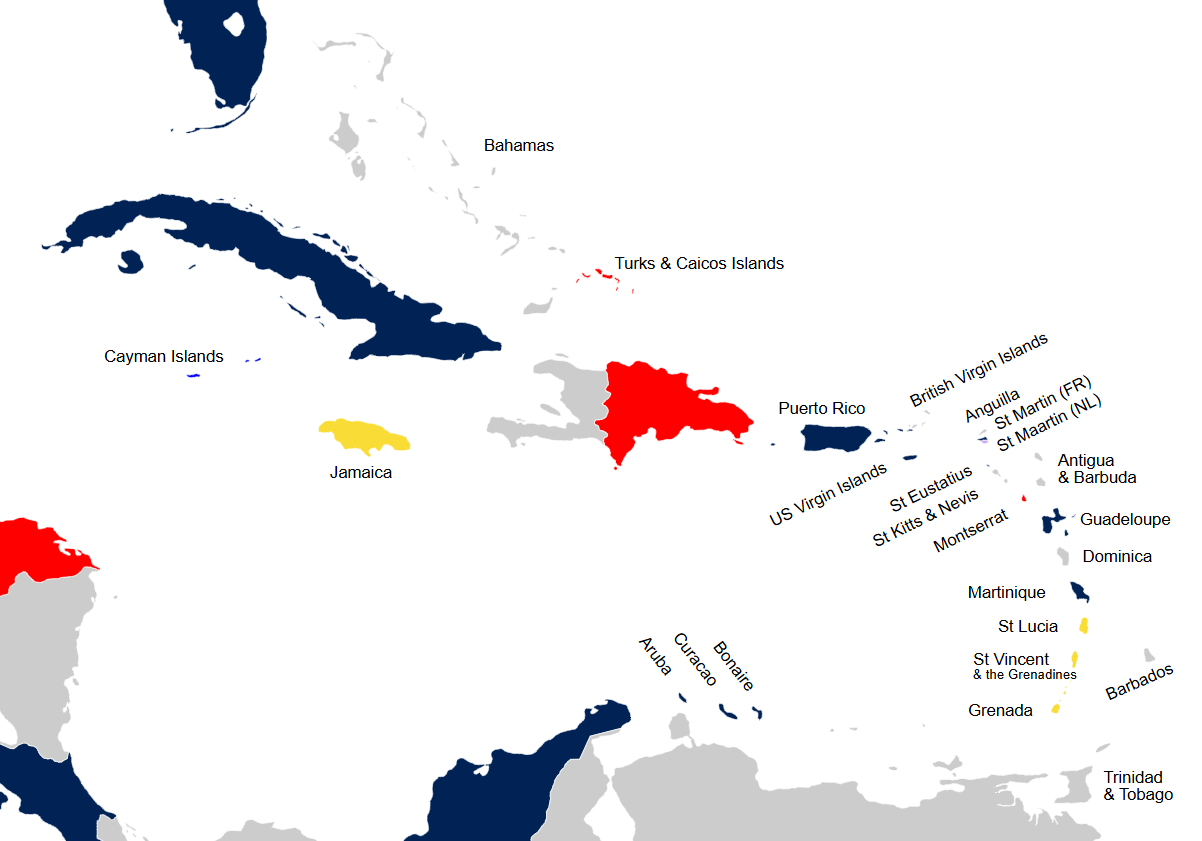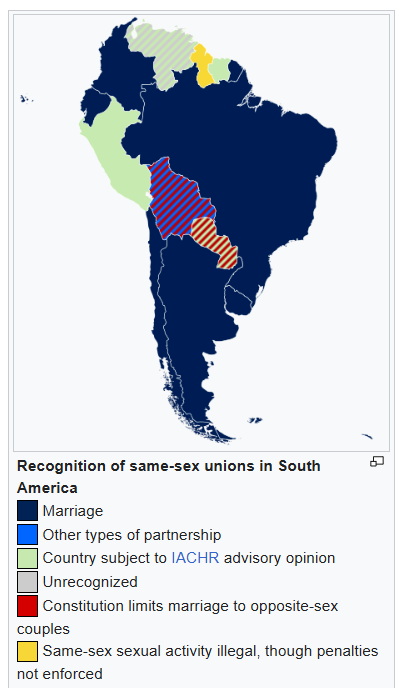2024 LGBTQ Rights Global Progress – Latin America and Caribbean
First in a series of updates about LGBTQ rights internationally, region by region
LGBTQ rights journalist Rob Salerno, an editor for Erasing 76 Crimes, surveys the status of LGBTQ rights and marriage equality in this series, starting with the Caribbean, Central America and South America. (Click here to subscribe to his LGBTQ Global newsletter.)
Caribbean

Dominica: Our most important victory in the region this year was the decriminalization of sodomy in Dominica – its buggery and gross indecency laws were struck down by the High Court (operating from the Eastern Caribbean Supreme Court/ECSC), or rather “read down” so that they do not apply to consensual acts in private. The government has not announced an appeal, as far as I’m aware, but they are emphasizing the law still applies to non-consensual acts or acts in public places.
Unlike recent judgements on the issue from other countries, the court did not find that Dominica’s constitution forbids discrimination on the basis of sexual orientation or gender identity – it explicitly rejected the idea that these were encompassed under the ban on “sex” discrimination.
St. Vincent and the Grenadines: And our most significant setback was here, when the High Court/ECSC upheld the country’s sodomy laws in an utterly baffling ruling in February. Seriously, the ruling pointedly ignores all of the evidence supplied by the plaintiffs and relies on outdated stereotypes about HIV and morality, and even denied the plaintiffs standing due to their being expats. To add insult to injury, they were also forced to pay the government thousands of dollars in costs. I am not aware of any pending appeal being filed, although there were reports back in February that the lawyers were considering it.
Neither of these cases were part of the multi-country legal strategy pursued by the Eastern Caribbean Alliance for Diversity and Equality (ECADE) with support from various legal groups in Canada and the UK, and which has already won victories in Antigua & Barbuda, Barbados, and St. Kitts and Nevis, all in 2022. ECADE has cases pending in Grenada and Saint Lucia, which have been awaiting their decisions for more than two years at this point.
Barbados: Parliament passed an updated Sexual Offences Act which formally deleted the sodomy laws that were struck down by the courts in 2022 and closed loopholes to ensure rape laws are gender neutral.
Dominican Republic: Speaking of sodomy laws, although DR doesn’t have generally applicable sodomy laws, it does criminalize sodomy involving members of the military or police forces (which should probably put it on our count of criminalizing countries). A court challenge against these laws was launched this year.
Trinidad & Tobago: The High Court decriminalized sodomy way back in 2018, but the government appealed the decision. The Court of Appeal was set to deliver its ruling in November, but instead asked for more time to deliberate. Remember, it’s been more than six years since the original decision. Whatever the outcome, the case is likely to be appealed to the Privy Council in London.
Jamaica: After the Supreme Court upheld Jamaica’s sodomy laws last year, an appeal was brought to the Interamerican Court of Human Rights, but I haven’t heard any further updates.
The government recently introduced a bill to drop the monarchy and become a republic, which it is saying is a first step in a process that will eventually see appeals to the Privy Council replaced with the Caribbean Court of Justice. If that happens, it could have important implications for gay rights, as the CCJ has been hostile to “savings clauses” like Jamaica’s, which protect colonial-era laws (including the sodomy law) from constitutional challenges.
UK Territories: Speaking of sodomy laws, several UK territories in the region still have inactive sodomy laws on their statute books: Anguilla, Cayman Islands, and Turks and Caicos. The UK declared these laws invalid in 2001 insofar as they apply to consensual acts between adults in private but didn’t actually delete the laws (Montserrat later codified this exception to its “buggery” law; Virgin Islands appears to have since deleted it entirely).
Turks and Caicos saw its first legal challenge seeking recognition of same-sex couples this year, when a binational married couple sued to obtain a work permit for the US partner. The court found the government refusing a spousal work permit for a same-sex spouse to be unconstitutional but ordered no remedy. Both the government and the couple are appealing the decision. The couple offered to drop the case if the government recognized civil partnerships, but the government refused.
An equal marriage case in the Virgin Islands is still pending.
The election of a Labour government with a huge majority in Parliament is likely a positive development for LGBT rights in these territories. PM Starmer has not made any statements about marriage rights in the territories, but various backbenchers and peers have called for imposing some form of relationship recognition, whether marriage or partnerships, on the holdout territories. At the very least, the UK could impose civil partnerships, as it can argue it is required to do so by the European Convention on Human Rights – the same argument it made on the sodomy laws 24 years age. Anguilla, Montserrat, Turks and Caicos, and Virgin Islands all lack any relationship recognition; Bermuda and Cayman Islands have civil partnerships but not marriage, the latter imposed by its British governor.
Dutch Territories: The other big news from the region this year was the Netherlands’ Court of Cassation ruling that Aruba and Curacao must allow same-sex marriage. It’s not yet clear if this includes adoption rights. Earlier in the year, a same-sex marriage bill was introduced in the Aruba parliament, but it failed on a tie vote with one abstention.
The ruling leaves only Sint Maarten within the Kingdom of the Netherlands without equal marriage, but that’s likely just a court challenge away. That territory elected a new government in 2024 that includes an MP who had previously introduced a same-sex marriage bill.
Haiti: Amid Haiti’s ongoing, years-long political crises, a new penal code that was issued by decree in 2020 has been delayed from coming into force again until June 2025. The new code, should it ever come into force, will modernize many sex-based offences, decriminalize abortion, and criminalize discrimination based on LGBT status.
Central America
Honduras: The government ended the ban on blood donations by men who have sex with men. An opposition legislator also proposed legalizing same-sex marriage, but my estimation is that this is unlikely to go anywhere soon.
Guatemala: A legislator introduced a bill to ban teaching of “gender ideology” in schools, in a disturbing sign that the same anti-LGBT tropes are migrating out of Eastern Europe and the USA into the region.
The government of El Salvador already had eliminating “gender ideology” as an education policy.
Belize: The government abandoned plans to pass an LGBT-inclusive anti-discrimination bill, amid opposition from the usual groups.
Costa Rica: A bill to ban conversion therapy has stalled in congress as the opposition proposed thousands of amendments to delay it.
South America

Argentina: The country is dealing with the election of far-right anarcho-libertarian (?) president Javier Milei last December. Milei has shut down whole departments of the government in order to stem spending, which has had the effect of deepening the country’s seemingly permanent economic crisis. One of the agencies shut down was the anti-discrimination agency, which has had an impact on LGBT people even though the country still lacks an LGBT-inclusive anti-discrimination law. Milei is also pushing to repeal a law that allows trans minors to update their legal gender.
Unsurprisingly, the far right in America is taking every mildly bit of optimistic news (look, the economic growth is less negative!) as a sign that this insanity should be imported here, so watch out.
In a bit of good news, Buenos Aires is looking to ban conversion therapy in the capital district.
Brazil: Lots of big victories came from the Supreme Federal Court this year. In March, the court extended paid paternity leave to the lesbian partners of women who give birth. In June, it ruled that schools have an obligation to prevent sexism and anti-LGBT discrimination and bullying. In October, the court ordered that trans people be given medical care according to their biological needs, and ordered the government to make forms trans-inclusive. This has included putting the option “parturient” in place of “mother” on birth certificates, which is a gender-neutral term meaning “person giving birth.”
Chile: The government attempted to strengthen anti-discrimination laws by creating an anti-discrimination body, but this was rejected in congress. The government also put forward a bill to fight bullying in schools.
Lawmakers also introduced a bill to allow people in a civil union (those still exist) to adopt – currently, adoption is restricted to married couples, whether straight or gay. The proposal has not advanced out of committee.
Colombia: A proposed ban on conversion therapy was rejected by the Senate.
Ecuador: Congress passed a bill allowing trans people of legal age to change their legal name and gender without requiring sex-affirming surgery.
Congress also rejected a bill that would have allowed same-sex couples and singles to adopt, on the ground that it would violate an explicit constitutional restriction of adoption to married heterosexual couples.
Guyana: Guyana still has the continent’s only sodomy law, and no court challenge to the law has yet been filed, even though it’s very likely to succeed.
Guyana’s mostly been concerned with maintaining the world’s highest GDP growth rate – thanks to the discovery of a massive oil field – and fending off a threatened annexation by neighboring Venezuela. We’d all forgotten about Essequibo, hadn’t we?
Paraguay: The government overhauled its sex education curriculum, but activists were horrified that it’s full of outdated and harmful gender stereotypes.
Peru: Toward the end of the year, congress had advanced a bill to create same-sex civil unions through one committee. The bill still has a long way to go before it’s passed into law, and it’s already drawn the ire of LGBT activists who want nothing short of marriage equality.
A legislator also tabled a bill to stiffen penalties for hate crimes in the last week of the year.
The government got into hot water after it issued a decree defining transsexualism as a “mental health problem,” in a bid to get it included in health care programs. After a month, the government amended and clarified that “gender discordance” would be covered.
The government also reiterated a 2021 decree that homosexuality is not a disease and cannot be “treated,” effectively creating an administrative ban on medical “conversion therapy.”
Venezuela: The country’s permanent political/economic crisis continued, as dictatorial president Maduro claimed victory in highly disputed elections. The government did not advance any of its long-promised proposals on LGBT rights this year, including marriage equality and gender recognition.




